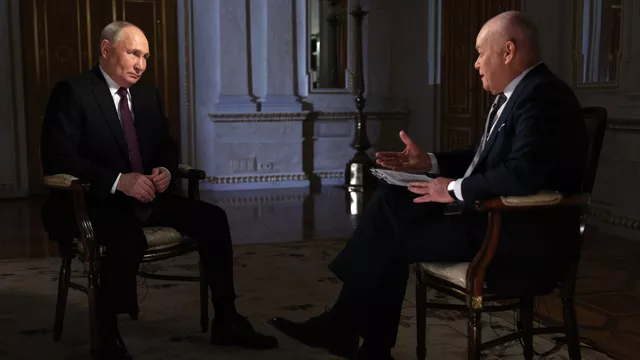By Kseniya Kirillova, for Jamestown Foundation
Executive Summary:
- Russian President Vladimir Putin’s declarations regarding Poland once again demonstrate that the Kremlin is trying to create and strengthen contradictions between its geopolitical enemies.
- Moscow has a similar policy regarding other Western countries, and Kremlin analysts do not conceal the fact that Russia finds itself in opposition to the entire Western world and wishes to weaken Europe.
- Even against the background of this rhetoric, the Kremlin is trying to win the favor of some Western elites and position Russia as the “true Europe.”
On March 13, Russian President Vladimir Putin, in an interview with a leading Russian propagandist, Dmitriy Kiselyov, declared that “if Poland sends troops to Ukraine, they will never leave” because “they want the return of lands they consider their own” (RIA Novosti, March 13). This is not the first time Russian officials have characterized Poland as a potential aggressor against Russia through Ukraine (see EDM, March 4). Last summer, the head of Russian foreign intelligence, Sergey Naryshkin, declared that “the dream of taking back Western Ukraine lives in the consciousness of the Polish elite,” and Poland “is undertaking a series of measures to realize this dream” (Izvestiya, June 23, 2023).
This is not the first instance of the Kremlin trying to sow discord between Poland and Ukraine, which have turned out to be close allies in countering Russian aggression. Another one of Moscow’s favored techniques is to speculate on historical conflicts between the two countries to add fuel to the fire. The most striking example of Moscow’s exploitation of history is the Volyn massacre—the mass murder of Poles in Volyn during World War II (TASS, July 11, 2023). When it is convenient, Russian propaganda depicts Poland as “a victim of Ukrainian Nazism,” which they proclaim to be a continuation of Hitler’s mission. Simultaneously, the Kremlin paints an entirely different picture of Poland to Ukraine as aggressive and even more at fault for starting World War II than Germany. For example, in his interview with US television personality Tucker Carlson, Putin said the Nazi German attack on Poland in 1939 was coerced, explaining that Warsaw “played too hard” and became “too intractable,” thereby “forcing” Hitler to attack (The Moscow Times, February 9).
These contradictions should come as no surprise, as sowing discord between allies is a favorite tactic of the Kremlin. They resort to any means to achieve this goal, even if they contradict one another. Poland is far from the only country where one may observe similar “political schizophrenia” from Moscow. The same may be seen in France. Russian propaganda boasts that Moscow is inflicting blow after blow on Paris, including military strikes—for example, killing French volunteers near Kharkiv (Eadaily.com, January 24). However, Russian military analysts simultaneously express hope that “a triumvirate of Russia, China, and France” may emerge (Topwar.ru, January 6).
Similar Kremlin duality may be seen in its relations with Europe as a whole, which was evident long before the full-scale invasion of Ukraine. On the one hand, Russian military analysts and propagandists have drawn direct parallels between the European Union and Hitler’s coalition. They argued that in World War II, “the Soviet Union fought with all of Europe,” which has historically been an enemy of Russia (Topwar.ru, December 29, 2019). On the other hand, the director Konstantin Bogomolov, a formally “liberal” supporter of the regime, has published “manifestos” proposing that Moscow position itself in the international arena as a center of gravity for the “healthy conservative forces” of Europe. The author tried to convince his European audience that only Russia could preserve the “genuine European values” that Europeans are losing (Novayagazeta.ru, February 10, 2021).
Since the beginning of the full-scale invasion, propaganda has intensified efforts to convince the population that Western civilization represents a “darkness” that is devouring itself (Sputniknews.ru, April 27, 2022). Philosophers prove that Russia today is opposed to the entire West, and this conflict is based on “civilizational and worldview differences” (Argumenti.ru, October 3, 2023). The Russian Institute of International Political and Economic Studies publishes editorials that state the West has been at war with Russia for 500 years without a break, first under the leadership of Great Britain and then the United States (Russtat.ru, June 1, 2023). At the same time, one of the founders of the Council on Foreign and Defense Policy, Sergey Karaganov, at the end of last year renewed his claim that Russians are “proper, healthy Europeans” and, therefore, Russia should not “cancel” “our European history” (RG, December 27, 2023).
Paradoxically, even these apparent contradictions can create a relatively solid picture in the minds of propaganda consumers. This image depicts how Russia, on the one hand, is historically a part of Western civilization but, on the other hand, is forced to resist it due to the treacherous politics of the West itself. This version of events, unfortunately, resonates not only with many Russians but also with a certain number of Europeans. That is why it is essential to convey real examples of Moscow’s aggressive sentiments toward the West to European audiences.
A good illustration of this is the “revelations” of Russian analysts, who do not conceal the fact that they may benefit from a “weak European Union in a state of permanent crisis” or from conflicts between individual countries (Russiancouncil.ru, September 4, 2018; Life.ru, January 19). Under the current regime, the Kremlin will always bet on weakening the West and exacerbating internal contradictions in European countries.
By Kseniya Kirillova, for Jamestown Foundation





